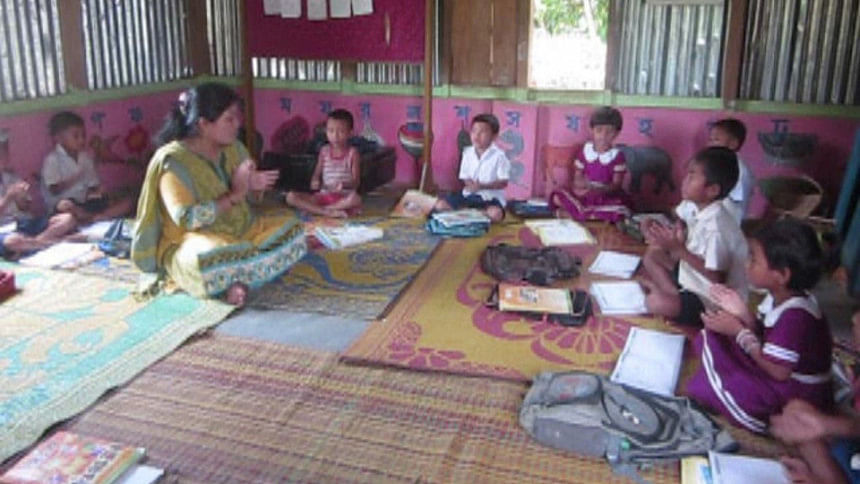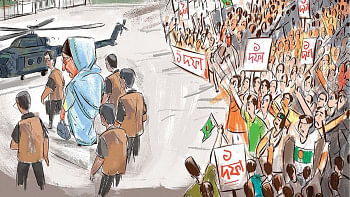Hill teachers in dire straits: They deserve to live in dignity

It may be hard to believe but Rajendra Lal Tripura, an assistant teacher of Hamachang Forungni Govt. Primary School, has not been getting his salary for the last two years. Talking to him, I was shocked to learn that he has to work as a day labourer under a local mohajon (carry bananas from the field to the local bazar) or do whatever work he could find on a Friday or when the school is closed. Being the sole breadwinner of a family of four, he needs an alternative source of income just to survive. So now he is a primary school teacher and also a day labourer. Many of the primary school teachers in Bandarban, Khagrachhari and Rangamati have been living in a similar situation.
A recent Daily Star report revealed that some 840 teachers of the 210 primary schools of the three hill districts have been spending their days in financial hardship as they have not been getting their salaries for the last two years. These schools were established under the supervision of United Nations Development Programme and Chittagong Hill Tracts Development Facility (UNDP-CHTDF) in 2010. After they stopped their activities in CHT, the schools were managed by the hill district councils until they were included in the government's nationalisation scheme in February 2017.
In an ideal situation, after a school is nationalised, it should get some basic facilities from the government such as funds to improve the physical structure of the school and to carry out other development activities. Following the nationalisation of their jobs, teachers should be getting salaries and other benefits under government-fixed grades. They should also get training to improve their teaching skills. When these schools of the CHT were nationalised, it was mentioned in the government's notification that the primary education offices concerned would create posts for the required number of teachers and then hire them under the government scheme. But two years into the nationalisation of the schools, no initiatives have been taken to regularise their jobs.
Meanwhile, these teachers had to find an alternative source of income to survive. Some of them have been working as shopkeepers or running small businesses while those who have some land are involved in cultivation. Then there are those who do not have any other option but to work as day labourers.
Talking to Jagadish Tripura, headmaster of the Hamachang Furongni Govt. Primary School, I learnt that after the school was nationalised, the teachers had managed to get stipends for students from the government. Apart from that, nothing much has improved—either for the teachers or for the students.
With the meagre salary primary-level teachers get, living a decent life is almost impossible. They are paid less than the salary of an upper division clerk of a government office. The situation of government primary school teachers is a little better than those of the non-government ones. In recent years, we have seen non-government primary school teachers take to the streets to press home their demands of nationalisation of their respective schools as well as their jobs. The teachers of the government primary schools have long been demanding the promotion of both trained and non-trained head teachers to the 10th grade of the 8th National Pay Scale and declare them as second-class gazetted officers and promote assistant teachers to the 11th grade. Currently, trained headmasters are getting their pay in the 11th grade while non-trained headmasters are in the 12th grade.
Although there were assurances from the government that they would look into the matter, their demands have not been met. And the slow pace of the whole process of nationalisation is also very depressing. It is simply not understandable why it is taking so long to regularise the jobs of the abovementioned 840 teachers of the CHT. There can be no justification for this delay when the teachers are living under such difficult circumstances.
Such hardship no doubt will have an adverse impact on the overall quality of primary education in the hill districts. When teachers have to work without salaries for years, what will motivate them to do their job sincerely? A survey conducted by the Campaign for Popular Education (CAMPE) in 2015 found the rate of teachers' absenteeism in primary schools to be 11.3 to 12.7 percent. No doubt, when teachers are deprived of their basic rights, this rate would increase.
Indigenous communities living in the hill districts have to face discrimination in many forms. There are still many villages without any primary schools at all. The present government has expressed its commitment to remove the hurdles that primary school teachers have been facing across the country. It has also pledged to provide indigenous children with books in their mother language. The government's positive attitude in safeguarding the indigenous communities' rights is praiseworthy. And we hope the government puts its words into action and takes initiatives to solve the complications that are preventing regularisation of jobs of such a large number of teachers and help them live with dignity.
Naznin Tithi is a member of the editorial team at The Daily Star.





Comments